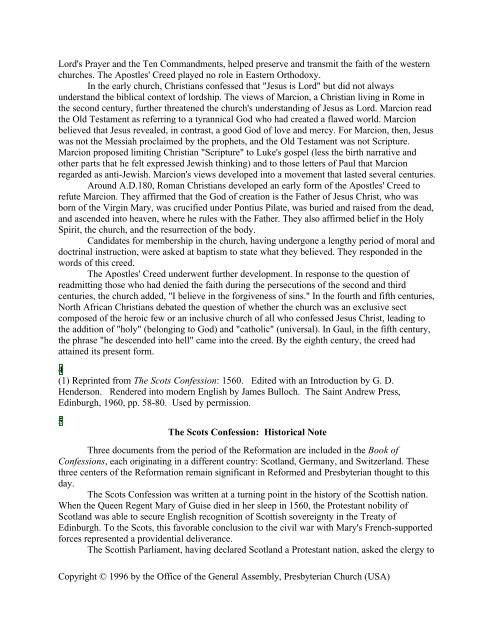The Book of Confessions - The Presbyterian Leader
The Book of Confessions - The Presbyterian Leader
The Book of Confessions - The Presbyterian Leader
Create successful ePaper yourself
Turn your PDF publications into a flip-book with our unique Google optimized e-Paper software.
Lord's Prayer and the Ten Commandments, helped preserve and transmit the faith <strong>of</strong> the western<br />
churches. <strong>The</strong> Apostles' Creed played no role in Eastern Orthodoxy.<br />
In the early church, Christians confessed that "Jesus is Lord" but did not always<br />
understand the biblical context <strong>of</strong> lordship. <strong>The</strong> views <strong>of</strong> Marcion, a Christian living in Rome in<br />
the second century, further threatened the church's understanding <strong>of</strong> Jesus as Lord. Marcion read<br />
the Old Testament as referring to a tyrannical God who had created a flawed world. Marcion<br />
believed that Jesus revealed, in contrast, a good God <strong>of</strong> love and mercy. For Marcion, then, Jesus<br />
was not the Messiah proclaimed by the prophets, and the Old Testament was not Scripture.<br />
Marcion proposed limiting Christian "Scripture" to Luke's gospel (less the birth narrative and<br />
other parts that he felt expressed Jewish thinking) and to those letters <strong>of</strong> Paul that Marcion<br />
regarded as anti-Jewish. Marcion's views developed into a movement that lasted several centuries.<br />
Around A.D.180, Roman Christians developed an early form <strong>of</strong> the Apostles' Creed to<br />
refute Marcion. <strong>The</strong>y affirmed that the God <strong>of</strong> creation is the Father <strong>of</strong> Jesus Christ, who was<br />
born <strong>of</strong> the Virgin Mary, was crucified under Pontius Pilate, was buried and raised from the dead,<br />
and ascended into heaven, where he rules with the Father. <strong>The</strong>y also affirmed belief in the Holy<br />
Spirit, the church, and the resurrection <strong>of</strong> the body.<br />
Candidates for membership in the church, having undergone a lengthy period <strong>of</strong> moral and<br />
doctrinal instruction, were asked at baptism to state what they believed. <strong>The</strong>y responded in the<br />
words <strong>of</strong> this creed.<br />
<strong>The</strong> Apostles' Creed underwent further development. In response to the question <strong>of</strong><br />
readmitting those who had denied the faith during the persecutions <strong>of</strong> the second and third<br />
centuries, the church added, "I believe in the forgiveness <strong>of</strong> sins." In the fourth and fifth centuries,<br />
North African Christians debated the question <strong>of</strong> whether the church was an exclusive sect<br />
composed <strong>of</strong> the heroic few or an inclusive church <strong>of</strong> all who confessed Jesus Christ, leading to<br />
the addition <strong>of</strong> "holy" (belonging to God) and "catholic" (universal). In Gaul, in the fifth century,<br />
the phrase "he descended into hell" came into the creed. By the eighth century, the creed had<br />
attained its present form.<br />
4<br />
(1) Reprinted from <strong>The</strong> Scots Confession: 1560. Edited with an Introduction by G. D.<br />
Henderson. Rendered into modern English by James Bulloch. <strong>The</strong> Saint Andrew Press,<br />
Edinburgh, 1960, pp. 58-80. Used by permission.<br />
5<br />
<strong>The</strong> Scots Confession: Historical Note<br />
Three documents from the period <strong>of</strong> the Reformation are included in the <strong>Book</strong> <strong>of</strong><br />
<strong>Confessions</strong>, each originating in a different country: Scotland, Germany, and Switzerland. <strong>The</strong>se<br />
three centers <strong>of</strong> the Reformation remain significant in Reformed and <strong>Presbyterian</strong> thought to this<br />
day.<br />
<strong>The</strong> Scots Confession was written at a turning point in the history <strong>of</strong> the Scottish nation.<br />
When the Queen Regent Mary <strong>of</strong> Guise died in her sleep in 1560, the Protestant nobility <strong>of</strong><br />
Scotland was able to secure English recognition <strong>of</strong> Scottish sovereignty in the Treaty <strong>of</strong><br />
Edinburgh. To the Scots, this favorable conclusion to the civil war with Mary's French-supported<br />
forces represented a providential deliverance.<br />
<strong>The</strong> Scottish Parliament, having declared Scotland a Protestant nation, asked the clergy to<br />
Copyright © 1996 by the Office <strong>of</strong> the General Assembly, <strong>Presbyterian</strong> Church (USA)




